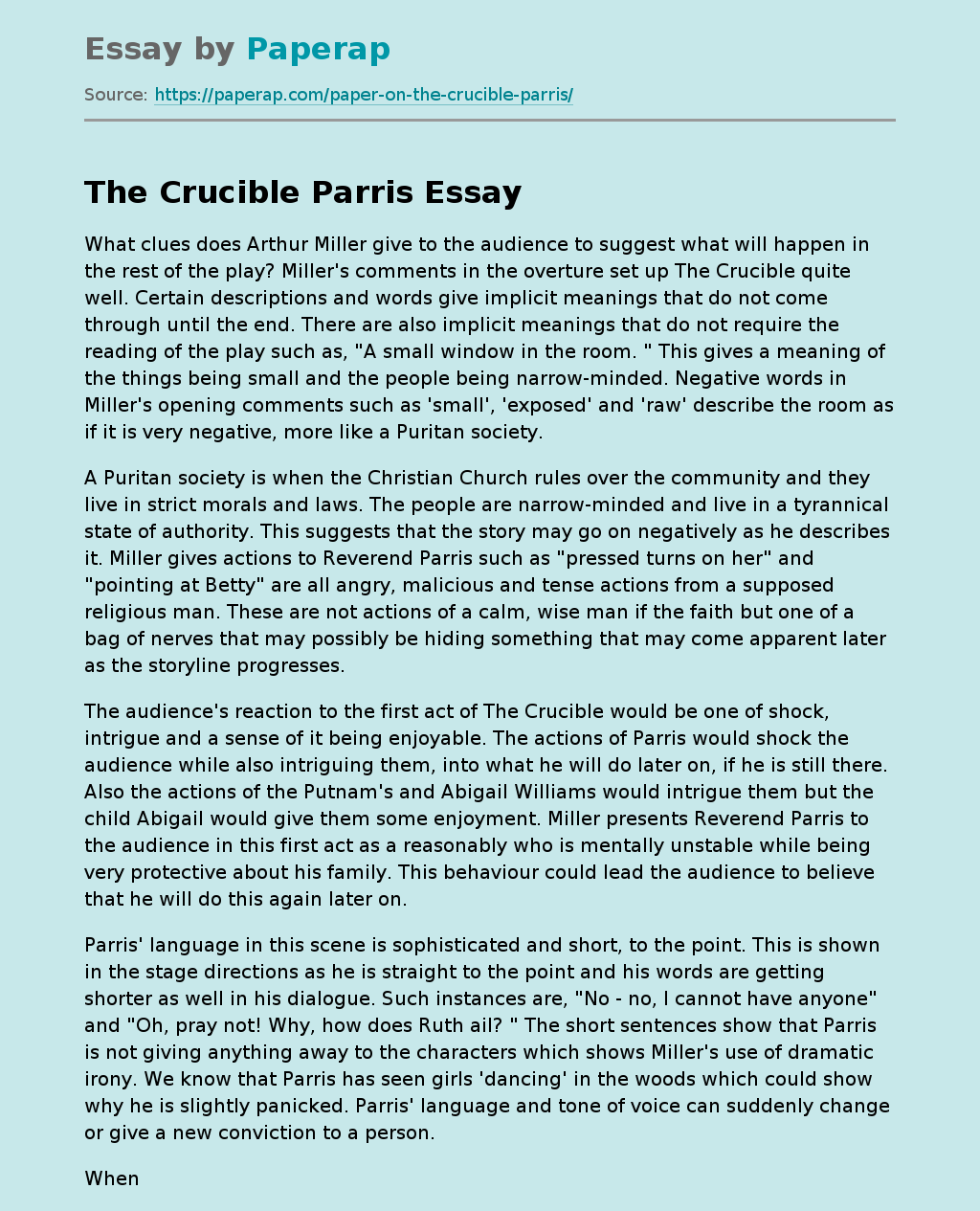The Crucible Parris
What clues does Arthur Miller give to the audience to suggest what will happen in the rest of the play? Miller’s comments in the overture set up The Crucible quite well. Certain descriptions and words give implicit meanings that do not come through until the end. There are also implicit meanings that do not require the reading of the play such as, “A small window in the room. ” This gives a meaning of the things being small and the people being narrow-minded.
Negative words in Miller’s opening comments such as ‘small’, ‘exposed’ and ‘raw’ describe the room as if it is very negative, more like a Puritan society.
A Puritan society is when the Christian Church rules over the community and they live in strict morals and laws. The people are narrow-minded and live in a tyrannical state of authority. This suggests that the story may go on negatively as he describes it. Miller gives actions to Reverend Parris such as “pressed turns on her” and “pointing at Betty” are all angry, malicious and tense actions from a supposed religious man.
These are not actions of a calm, wise man if the faith but one of a bag of nerves that may possibly be hiding something that may come apparent later as the storyline progresses.
The audience’s reaction to the first act of The Crucible would be one of shock, intrigue and a sense of it being enjoyable. The actions of Parris would shock the audience while also intriguing them, into what he will do later on, if he is still there.
Also the actions of the Putnam’s and Abigail Williams would intrigue them but the child Abigail would give them some enjoyment. Miller presents Reverend Parris to the audience in this first act as a reasonably who is mentally unstable while being very protective about his family. This behaviour could lead the audience to believe that he will do this again later on.
Parris’ language in this scene is sophisticated and short, to the point. This is shown in the stage directions as he is straight to the point and his words are getting shorter as well in his dialogue. Such instances are, “No – no, I cannot have anyone” and “Oh, pray not! Why, how does Ruth ail? ” The short sentences show that Parris is not giving anything away to the characters which shows Miller’s use of dramatic irony. We know that Parris has seen girls ‘dancing’ in the woods which could show why he is slightly panicked. Parris’ language and tone of voice can suddenly change or give a new conviction to a person.
When he is arguing with his niece, Abigail Williams, about the girls dancing in the woods and far from just accepting it as just “sport” he thinks they are conjuring spirits and practising witchcraft. “(turns now, with new fear, and goes to Betty, looks down at her, and then gazing off): Oh, Abigail, what proper payment for my charity! Now I am undone. ” He is accusing Abigail for just taking him for granted. What he means by ‘undone’ is his reputation. Miller suggests his reputation as a minister is more and more becoming dented by the accusation of witchcraft on his household.
Abigail Williams is introduced to us as a, “striking beautiful girl… with the endless capacity for disassembling. ” This shows that Abby(Abigail) is a beautiful girl who can take things apart but this was not meant a literally. She can take peoples lives, families and reputations apart by using her beautiful looks or by some other means. The actions of Abby in the start of Act 1 as a timid servant to her uncle, Parris, but throughout the act she gains confidence and starts to accuse Tituba, the Negro slave, of raising the Devil but there is no proof of this.
At the end of Act 1, however, we can see her “endless capacity for disassembling” when she “wants to open herself to God” and Betty mysteriously becomes awakened and accuses random people it seems, in the village. Abby joins Betty in this and accuses Goody Sibler of being with the Devil. The stage direction states, (It is rising with a great glee) and this direction shows Miller’s quickening of the accusations and the increased number of accusations. At the start of The Crucible Parris gives a sense of dramatic actions and one that could have lead to all the hysteria.
Parris’ stage directions are, “(scrambling to his feet in a fury. )” Miller shows him distraught and such an action to happen so quickly the audience would remember that clearly in the later scenes. The themes of causing hysteria are when Parris presses against Abby convicting her of conjuring spirits. “(Pressed, turns on her)”, Parris is anxious to know what has happened to Betty and goes over the top with Abby, evading her personal space and with the play being performed would mean that it would look very effective.
The Crucible Parris. (2017, Oct 20). Retrieved from https://paperap.com/paper-on-the-crucible-parris/

